The Coming of Conan Re-Read: “The Pool of the Black One”
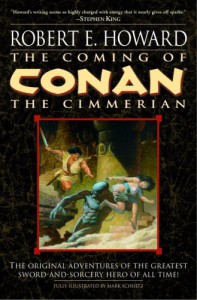 Bill Ward and I are reading our way through the Del Rey Robert E. Howard collection The Coming of Conan. This week we’re discussing “The Pool of the Black One.” We hope you’ll join in!
Bill Ward and I are reading our way through the Del Rey Robert E. Howard collection The Coming of Conan. This week we’re discussing “The Pool of the Black One.” We hope you’ll join in!
Bill: “The Pool of the Black One” closes off a trio of lesser Conan short stories written at a time when REH was absolutely in command of the character, but perhaps also a bit willing to sacrifice overall quality for a finished and saleable manuscript.
All three stories pair Conan with an attractive and scantily clad woman, and in two of them she is the object of his rescue. Certain elements repeat to the point where these tales tend to echo each other, and all three betray passages of hasty writing and plot trumping character. In the “Hyborian Genesis” essay at the back of the Del Rey edition of The Coming of Conan, Patrice Louinet explains that these stories were written in short succession, and sold immediately. REH was cracking the Weird Tales formula and, if the result isn’t exactly on par with the best of his work or the best of Conan, he was still producing fun fantasy adventure stories.
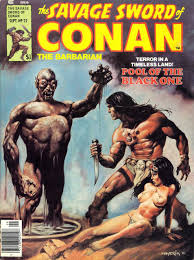 Howard: That’s right — they’re still fun. Conan himself’s in top form, even if REH himself is a little rushed. I think Olivia, from “Iron Shadows in the Moon,” is far and away the bravest and most useful of the sexy lawn ornaments Conan picks up to take with him in these stories.
Howard: That’s right — they’re still fun. Conan himself’s in top form, even if REH himself is a little rushed. I think Olivia, from “Iron Shadows in the Moon,” is far and away the bravest and most useful of the sexy lawn ornaments Conan picks up to take with him in these stories.
I’ll say this for “The Pool of the Black One:” it never really lets off. It starts with a bang and keeps rolling. Really, from the opening up until Conan looks around the jungle city it’s pretty compelling, even if the scenes with Sancha are kind of gratuitous. Not that I minded them, especially when I was younger, but…
Bill: Agreed, although I’d personally rate “The Pool of the Black One” as the weakest of the three stories despite, as always, there being some great elements to the piece. We have yet another strong beginning — Conan, dripping with sea water, climbing aboard a ship at sea. He interrupts the sunbathing of Sancha, mistress of the pirate captain Zaporavo, and again we are treated to an introduction of the Cimmerian through the eyes of others.
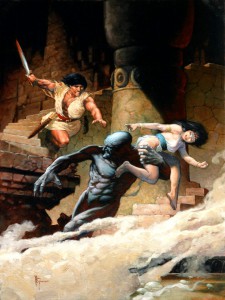 Howard: And let’s not forget that completely badass moment when Conan’s asked how he got here, and he says, simply, “I swam.” And how about how he makes “friends?” That’s actually pretty funny stuff, a point I didn’t realize quite so clearly until I saw it drawn up in comic form.
Howard: And let’s not forget that completely badass moment when Conan’s asked how he got here, and he says, simply, “I swam.” And how about how he makes “friends?” That’s actually pretty funny stuff, a point I didn’t realize quite so clearly until I saw it drawn up in comic form.
That said, I think I actually like this one a little more than “Iron Shadows.” It had a better heroine and moments of better writing, but I prefer the pacing of this one, and, honestly, the first half of it has some moments I enjoy more than almost anything in “Iron Shadows.”
Bill: There are definitely things I like better in this story. Like how Conan’s plan to eventually take over the ship from Zaporavo is well telegraphed, and Conan — after first killing a sailor who challenged him with one punch — begins a campaign of winning over the pirates that is fully the most clever thing he does in the story. The reader can’t help but compare it to “Iron Shadows,” where Conan’s attempt to supplant a pirate captain wasn’t exactly met with enthusiasm from the crew. Here we see a cagier and wiser Conan working within the laws of the Freebooters for his own eventual gain.
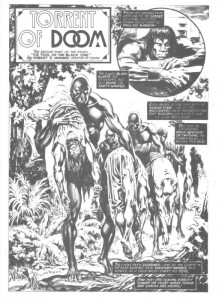 Howard: Agreed. I love that line about how Zaporavo’s hesitation results in him losing everything. REH skipped ahead in time to tell us exactly what was going to happen and that the character was going to die. These days when I write a line like that people get irritated with me and say that it “ruins the surprise.” Fah. I think it’s a fine old storytelling technique.
Howard: Agreed. I love that line about how Zaporavo’s hesitation results in him losing everything. REH skipped ahead in time to tell us exactly what was going to happen and that the character was going to die. These days when I write a line like that people get irritated with me and say that it “ruins the surprise.” Fah. I think it’s a fine old storytelling technique.
Bill: It certainly is, and is more the norm for traditional western drama than some necessity of “surprise.” No one goes to see Hamlet for a twist ending.
Howard: Notice, also, that we don’t get the viewpoint of Conan himself until we’re introduced to him by name, and that Sancha thinks of him as a Barachan at first rather than a Cimmerian because she doesn’t know better. I liked that REH was keeping the viewpoint to only what she could know.
Bill: Indeed. The “Barachan’s” antagonism to Zaporavo is what leads him to follow the captain into the wilds of an island they stop to investigate. Zaporavo has been spending time with ancient texts, looking for lost treasures, and the mysterious island may be just the place. Conan kills the captain — sensibly in private this time — but when doing so he sees something unexpected, a tall black figure with a white captive. Conan, somewhat unrealistically to my mind, follows the figure out of curiosity, and finds the lost city of the tale.
 Howard: And therein the story gets a little lost. The adventure’s fun, but it seems much more clear that it was just an excuse for some mystery, horror, violence, and a hot quivering naked woman. (And why did she have to be naked to swim? Probably just for the benefit of readers.) Why was the pirate captain here? We never know. I’m not sure REH cared. And as to hasty construction, REH didn’t bother to mention that the black man drowning the sailor was wearing a crown until after the fact, something I feel like he normally would have addressed. It’s almost as if he wrote that in as an afterthought and couldn’t be bothered to go back and revise the text.
Howard: And therein the story gets a little lost. The adventure’s fun, but it seems much more clear that it was just an excuse for some mystery, horror, violence, and a hot quivering naked woman. (And why did she have to be naked to swim? Probably just for the benefit of readers.) Why was the pirate captain here? We never know. I’m not sure REH cared. And as to hasty construction, REH didn’t bother to mention that the black man drowning the sailor was wearing a crown until after the fact, something I feel like he normally would have addressed. It’s almost as if he wrote that in as an afterthought and couldn’t be bothered to go back and revise the text.
Bill: My thoughts exactly; I think things sometimes feel a bit vague. The weird elements of the story are a lot of fun, but I don’t think they were necessarily used to best effect. A lost city of green translucent material is great idea — it can’t really be seen as any different than the forest at a distance. The strange non-human race of black-skinned giants is reminiscent of those cursed in “Iron Shadows in the Moon,” and I suspect they are the same people. The weirdness of the pool, the sacrifice that forces the victim to dance with unwholesome abandon before being flung into the liquid and ending up as a tiny statue on the shelves around the pool itself, is great weird stuff. The hinting at the many races thus encountered by the ancient dwellers in the city is a nice touch that helps elevate the scene in the city and give things a nice sense of mystery, before everything turns into a brawl. The climax of the story, with Conan and the rescued pirates racing to their ship ahead of the green ‘lava flow’ of the pool is also a terrific final beat.
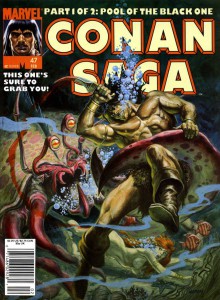 But I still think the story feels a bit flimsy in places, a bit forced. The formidable nature of the villains — giants with huge talons — seems a bit undermined by Conan’s ability to take on a horde of them. Conan charging to Sancha’s rescue and coordinating a rescue plan with her also felt like a bit of a reach to me, making Conan feel more like a generic action star than, well, Conan. The city itself seemed only a sketch. There weren’t really any of those grand character moments I look for in these stories, examples of Conan being Conan. And nothing really about civilization and barbarism in conflict, beyond perhaps a description of Conan’s fighting style being based on instinct and perfect physical condition as opposed to Zaporavo’s mastery of technique.
But I still think the story feels a bit flimsy in places, a bit forced. The formidable nature of the villains — giants with huge talons — seems a bit undermined by Conan’s ability to take on a horde of them. Conan charging to Sancha’s rescue and coordinating a rescue plan with her also felt like a bit of a reach to me, making Conan feel more like a generic action star than, well, Conan. The city itself seemed only a sketch. There weren’t really any of those grand character moments I look for in these stories, examples of Conan being Conan. And nothing really about civilization and barbarism in conflict, beyond perhaps a description of Conan’s fighting style being based on instinct and perfect physical condition as opposed to Zaporavo’s mastery of technique.
Howard: I didn’t mind the rescue so much, I just wish that we’d seen something more to the city, or learned about the treasure, or what have you. Like you said, the city felt like it was just a stage backdrop against which we saw the scenes being played out. We did get a little bit of a sense of barbarism versus civilization in the description of the terrible giant playing on the strange instrument and making the young sailor perform that terrible dance.
I thought the final moments gave us a slam-bang conclusion. The chase was grand, and it shows us how important having a full crew was to Conan that he makes sure all are up and moving before he himself departs — not because he gives a damn about them so much, but because he needs them to help man the ship. And the final words about enjoying life while he has it, along with the ship and sweet lips, is nicely done.
Bill: In the end I think the lesser Conans feel different than the better yarns because they seem more self-consciously to be telling an adventure story. Stories like”The Tower of the Elephant” and “Black Colossus” (despite its sallets and pauldrons) can suspend a reader’s disbelief into next week, but “Xuthal of the Dusk” and “The Pool of the Black One” feel very much like the artifacts of one person’s productive mind — they feel like stories. Conan at its absolute best transcends all that, at least it does for me and I suspect a great many other fans, and I suppose it always seems a bit unfair to compare the lesser stories to the best ones — REH sets a very high bar for himself and everyone else.
Howard: Fairly said, both about Conan’s transcendence (for I think when REH writes him the character elevates even a more minor work) and about the self-conscious creation of an adventure story versus a tale with sense of myth. The best Robert E. Howard stories rank among the finest adventure stories ever written, and are thick with mythic power. Some of those are Conan stories. Not all of them are great, though, and not all of them could be. Yet Conan himself fascinates even in these weaker tales, and all that we’ve read so far have moments of excellence.
Bill: True enough, even on a bad day Conan stands apart. That said, next week features one of my favorites in the Conan canon, “Rogues in the House.”
(Howard: As an added treat, here’s a link to some great moments from The Savage Sword of Conan. A section near the end illustrates Conan’s welcome among the pirates.)
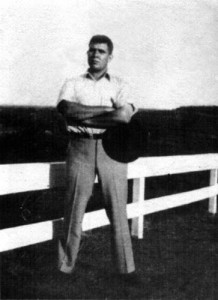
15 Comments